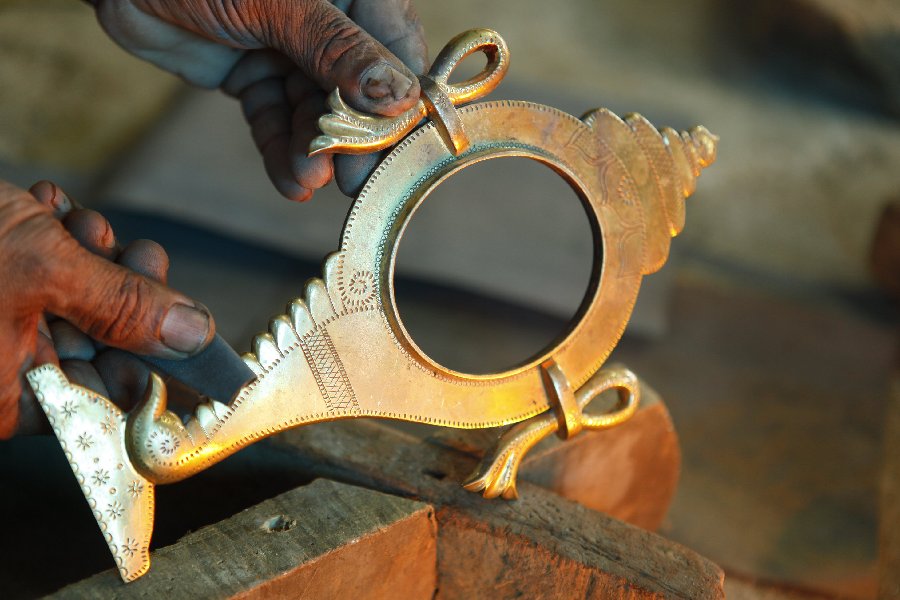The Aranmula Mirror, a metallurgical wonder and GI-protected centuries-old handicraft from Kerala, whose priced pieces adorn the British Museum and Buckingham Palace, is now under threat from the effects of climate change.
The 2018 floods and the extreme rainfall events that continue to trouble Kerala have depleted a key raw material — the clay from the river Pamba's basin — used to create the casts that make the one-of-its-kind handicraft, say its craftsmen.
Known as the Aranmula Kannadi (mirror) in Malayalam, as it is a product of the temple town of Aranmula in Pathanamthitta district, the metal alloy mirror was given a geographical indication tag in 2004-2005 for its super exclusivity.
Made by the finest craftsmen for generations, the unique product has been given on many occasions as a gift to heads of state visiting India by Indian authorities. Prime Minister Narendra Modi, on his visit to the UK in November 2015, presented an Aranmula Kannadi to then British First Lady Samantha Cameron.
But now the artisans who make the true-reflection mirror are finding it hard to source the clay with the requisite qualities, as the past few years' floods and landslides in the area have changed the chemical and physical properties of the soil in Aranmula Village.
"The quality of the soil has changed after the 2018 floods. Earlier, we used to take the topsoil from the fields to make the casts for the mirror. Now we have to dig deeper to get the soil that we require, and even that is of poor quality," Manoj S, who has been making Aranmula Mirrors for the past 20 years, told PTI.
Manoj and his family live in a house close to the river Pamba in Aranmula, where the mirror-making unit is also located. His house, a one-storied building, was completely submerged in water during the 2018 floods.
"The floods have deposited huge amounts of silt on the soil, causing damage to the original soil here, which is essential for making Aranmula mirrors," Manoj said.
The Kerala Soil Survey Department also confirms the changes in the chemical and physical properties of the soil in flood-affected areas of Kerala.
"Our study after the 2018 floods in 13 districts has identified significant changes in soil quality. The quality of the soil in the Pamba basin, where Aranmula is located, has deteriorated significantly," V Justin, Assistant Director, Soil Survey Department, Pathanamthitta, told PTI.
Extreme rain events can worsen the situation, he adds.
Topsoil erosion and silt deposits during flash floods could cause a major problem in areas like Aranmula. If these areas get flooded again, more silt will get deposited and contaminants could further alter the soil characteristics, he said.
"Large quantities of sand, silt, and clay were seen deposited on the surface soils of the affected panchayats. The thickness of deposition varied from 2cm to 10cm. Soil crusting was also reported from these depositional areas," the study titled, 'Soil Health Status of Kerala in Post Flood Scenario' said.
According to the study, in Pathanamthitta district, there was a change in the texture of the soil, from clay loam to sandy clay loam. The study also identified increasing acidity in the soil after the floods as a major problem and found that there was a great imbalance in the chemical components in the soil.
"The soil we use should have the right level of stickiness so that the cast would hold properly in extreme temperatures. The soil we get now cracks easily, and that damages our mirror while moulding," Sooraj Acharya, who runs Sundar Handicrafts, one of the 26 traditional mirror-making units left in Aranmula, said.
The clay discs made from the soil -- which are now often turning into a grainy paste -- and are baked at a high temperature, are integral to getting a good-quality mirror.
These discs are reused several times, and if the quality of clay is not good, they can crack, leaking out the hot metal mixture for the mirror from the clay cast.
A mixture of tin and white lead for the mirror is filled up in the clay cast, containing the clay discs, and then heated up. Once the metal mixture is melted, the clay cast is turned over, allowing the melted metal mixture to flow into the space between the discs. It is then cooled and taken out.
"A smooth-surfaced mirror has to come out, and for that the quality of the clay cast and discs is paramount. With the present soil quality, we lose at least 10 to 15 mirrors when we cast 50 of them," Sindhu G, president of the association of Aranmula Mirror workers, and a traditional mirror maker, said.
The metals used and their proportion in the alloy are secrets that have traditionally been passed down through generations.
Though the Soil Survey Department has been studying the deterioration of soil quality in Kerala after the floods and due to the effects of climate change, they are yet to take up the concerns of the Aranmula mirror workers.
"We were unaware of the problems faced by the artisans due to the deteriorating soil quality. We will propose a detailed study in this regard with the permission of the director and will explore means to conserve the required quality of the soil for the artisans of Aranmula," Justin told PTI.
Except for the headline, this story has not been edited by The Telegraph Online staff and has been published from a syndicated feed.











